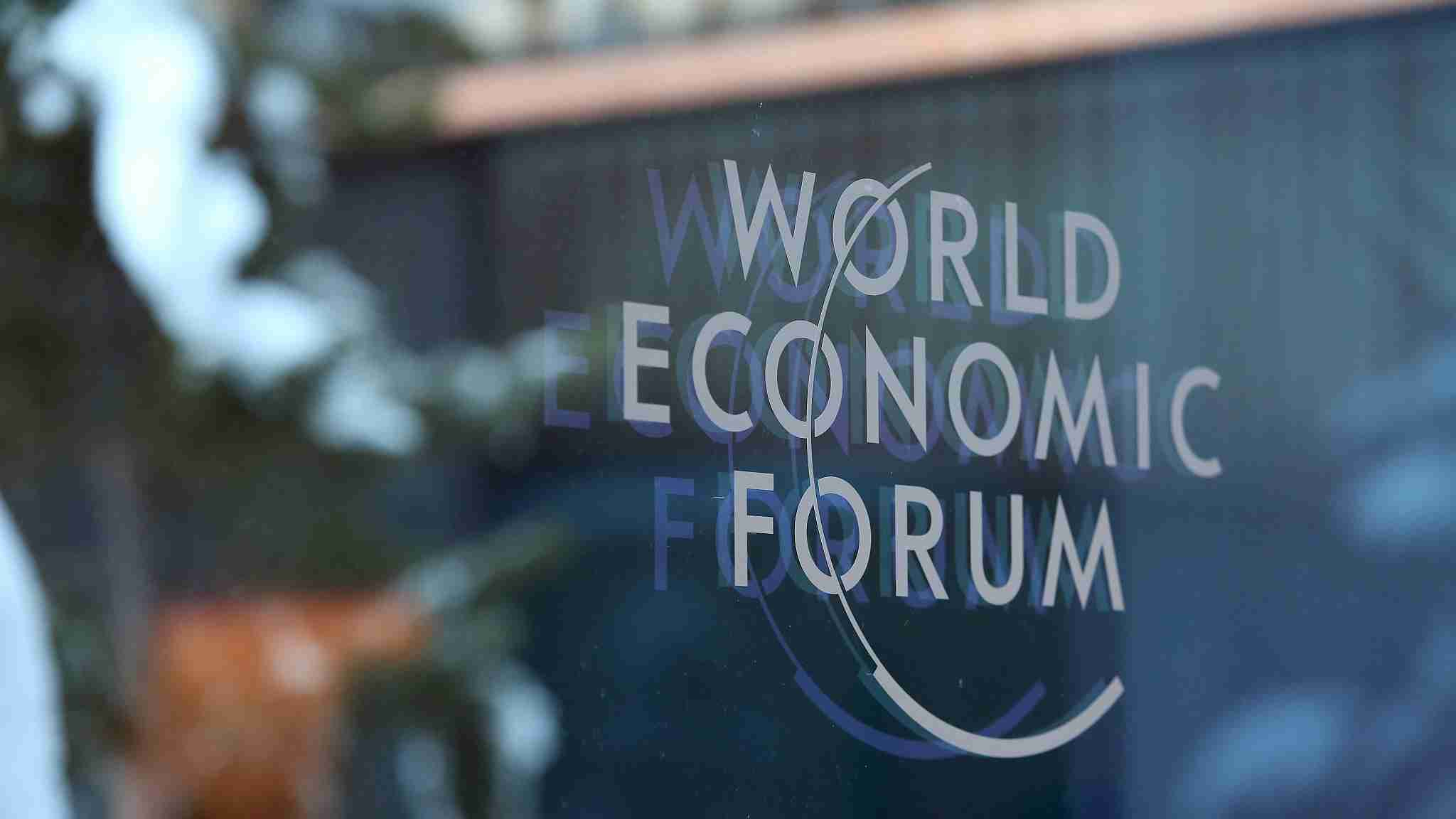
The logo of World Economic Forum.
The logo of World Economic Forum.
Editor's note: Alexander Friedman is a co-founder of Jackson Hole Economics. Jerry Grinstein is a former chairman and CEO of Delta Air Lines and Burlington Northern Railroad. Larry Hatheway is a co-founder of Jackson Hole Economics. Charles C. Krulak is a former Commandant of the U.S. Marine Corps and President of Birmingham-Southern College. The article reflects the authors' opinions and not necessarily the views of CGTN.
The World Economic Forum's annual flagship meeting this year will focus on how to build a more cohesive and sustainable world. As always, the topic is timely, but also a little abstract. To help give it more concrete form, we have a few proposals to put the prevailing economic model on a better track and focus the discussion.
First, it is time to overhaul the U.S. tax code to reduce structural wealth inequality. To that end, America should get rid of the "carried-interest" loophole. A provision that was originally intended to encourage long-term investment has become a massive tax break for financiers working in private equity and at hedge funds.
Although the 2017 Tax Cuts and Jobs Act placed some limitations on this finance-friendly rule, it remains in place.
By the same token, America should do away with the "stepped-up cost basis" loophole, which has become a key way by which the rich avoid taxation when bequeathing their wealth to their heirs. As such, it has enabled the rich to become dynastic, undermining America's ostensible commitment to meritocracy.
Second, the United States desperately needs to clean up its student-loan mess – a huge burden on the young – by establishing a national trust along the lines of what Australia has done. In Australia, a student borrows what she needs to fund her education, and the loan is repayable from a predetermined proportion of her subsequent income for a specified number of years.
Students who end up with lower future incomes pay less than they borrowed, but this is offset by higher earners. And graduates who enter certain forms of public service should be offered debt-forgiveness incentives.
Third, we need to change corporate reporting to encourage more long-term, sustainable thinking. The first step is to end the obsession with quarterly earnings. The pursuit of financial analysts' targets every three months warps the way CEOs and boards make decisions and undermines long-term thinking.
On a related note, share buybacks deserve more critical attention. S&P 500 companies now routinely use profits or borrowed money to repurchase their shares, instead of investing in new factories, business lines, or other key capital expenditures. Over the last ten years, around five trillion U.S. dollars have been spent on this method of boosting reported earnings per share (and thus the stock price).
Corporate reporting should be changed to explain clearly how much of a share-price movement is largely attributable to buybacks, and boards and shareholders should adjust executive compensation accordingly.

Moreover, corporations worldwide should start reporting sustainability metrics. Corporate reporting influences corporate behavior, but companies generally are required to report only their financial position, based on audited income and balance-sheet accounting standards.
This should be expanded to include broader stakeholder metrics such as customer satisfaction ratings, diversity scores, carbon footprints, charitable giving, political donations, and the pay gap between senior executives and average rank-and-file employees.
Boards for stakeholder-reporting standards (special-purpose bodies, akin to the Financial Accounting Standards Board) should be created to oversee newly agreed worldwide conventions for non-financial reporting.
Fourth, a global agreement to levy a 0.1 percent tax on financial transactions, similar to what is done in Hong Kong, would help to rein in the financial system. A transaction tax benefits long-term investors over short-term speculators, adds just enough friction into the financial system to help reduce bubbles, and, most critically, better aligns the cost of managing the system to those who benefit the most from it.
According to the Congressional Budget Office (CBO), a 0.1 percent transaction tax could produce around one trillion U.S. dollars in much-needed extra revenue in the U.S. alone over a decade.
Fifth, countries need to raise minimum wages and index them to inflation. In the U.S., a federally mandated 15 U.S. dollars per hour national minimum wage would help to level the playing field, and automatically adjusting it in line with the rising cost of living would help everyone keep up.
According to the Chicago Federal Reserve Bank, these steps would also increase aggregate demand in the world's largest economy.
Sixth, in all countries an overhaul of national income accounting is in order. Since it was introduced in the 1940s, gross domestic product has assumed unofficial status as the primary measure of national welfare.
Yet, when "progress" is equated with GDP, policymaking becomes an exercise in boosting gross national income without regard to the attendant social or environmental costs. New metrics are required to measure wellbeing net of cost.

National income should include the costs of externalities such as environmental degradation or greenhouse-gas (GHG) emissions. Thus measured, net income would more accurately reflect sustainable growth.
Moreover, all countries should agree to common standards for incorporating other measures of social progress. These could include life expectancy; infant mortality; the detection, prevention, and treatment of common diseases; GHG emissions per capita; biodiversity; educational attainment; income distribution; human trafficking levels; and socioeconomic achievement by gender and minority groups.
The Bretton Woods institutions could research and develop the new common standards of national welfare that we need, and introduce them through their widely followed publications.
Last, but by no means least, urgent action must be taken to address climate change in a way that shares the costs fairly within countries and between generations. Mitigation policies must be made appealing. Carbon taxes are necessary, but so are subsidies.
According to the U.S. Joint Committee on Taxation and the CBO, a carbon tax of 25 U.S. dollars per ton with annual inflation-adjusted increases of two percent would raise one trillion U.S. dollars in the U.S. over a decade.
It makes sense to earmark even more than that amount to help those made worse off by the tax, namely today's coal-, oil-, and gas-producing communities, as well as families on low or modest incomes hit by regressive taxation.
Subsidies could take the form of cash payments, re-training, new infrastructure projects, and investment in alternative energy industries in "coal and oil country." Importantly, the subsidies must be greater than the carbon tax revenues.
The resulting increase in national debt is rightly the obligation of future generations, who will benefit most from the transition to a low-carbon economy.
In short, climate policy must have tangible benefits today if it is to be politically acceptable. Consider this: as e-commerce reduces demand for physical shopping, communities should buy vacant malls and stores – again with debt to be paid off by future generations – and replace them with carbon-capturing green spaces.
These practical steps, in aggregate, would go a long way toward helping realize the vision of "stakeholder capitalism" and sustainability that Davos has propagated for a half-century.
Copyright: Project Syndicate, 2020.
(If you want to contribute and have specific expertise, please contact us at opinions@cgtn.com.)